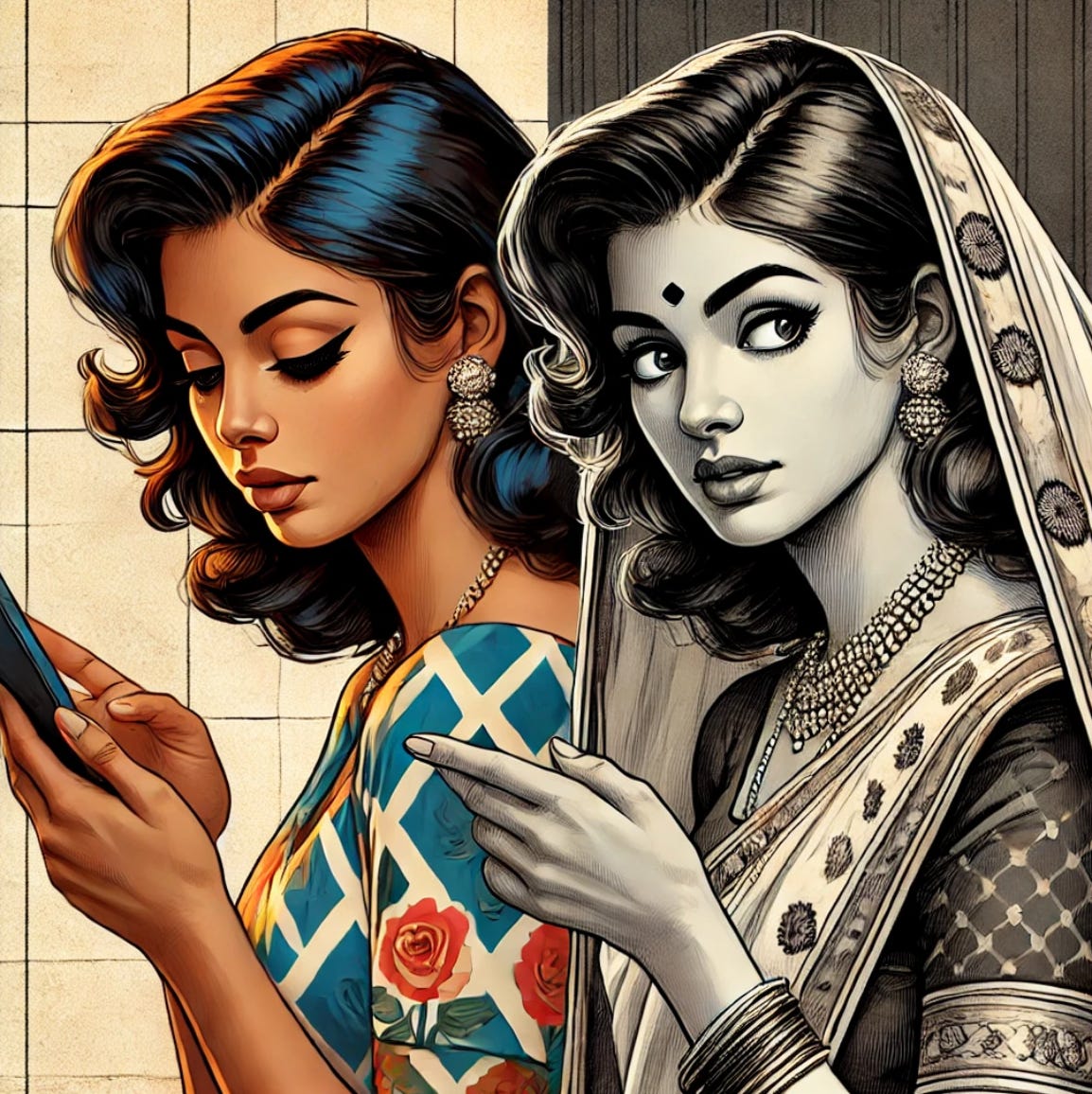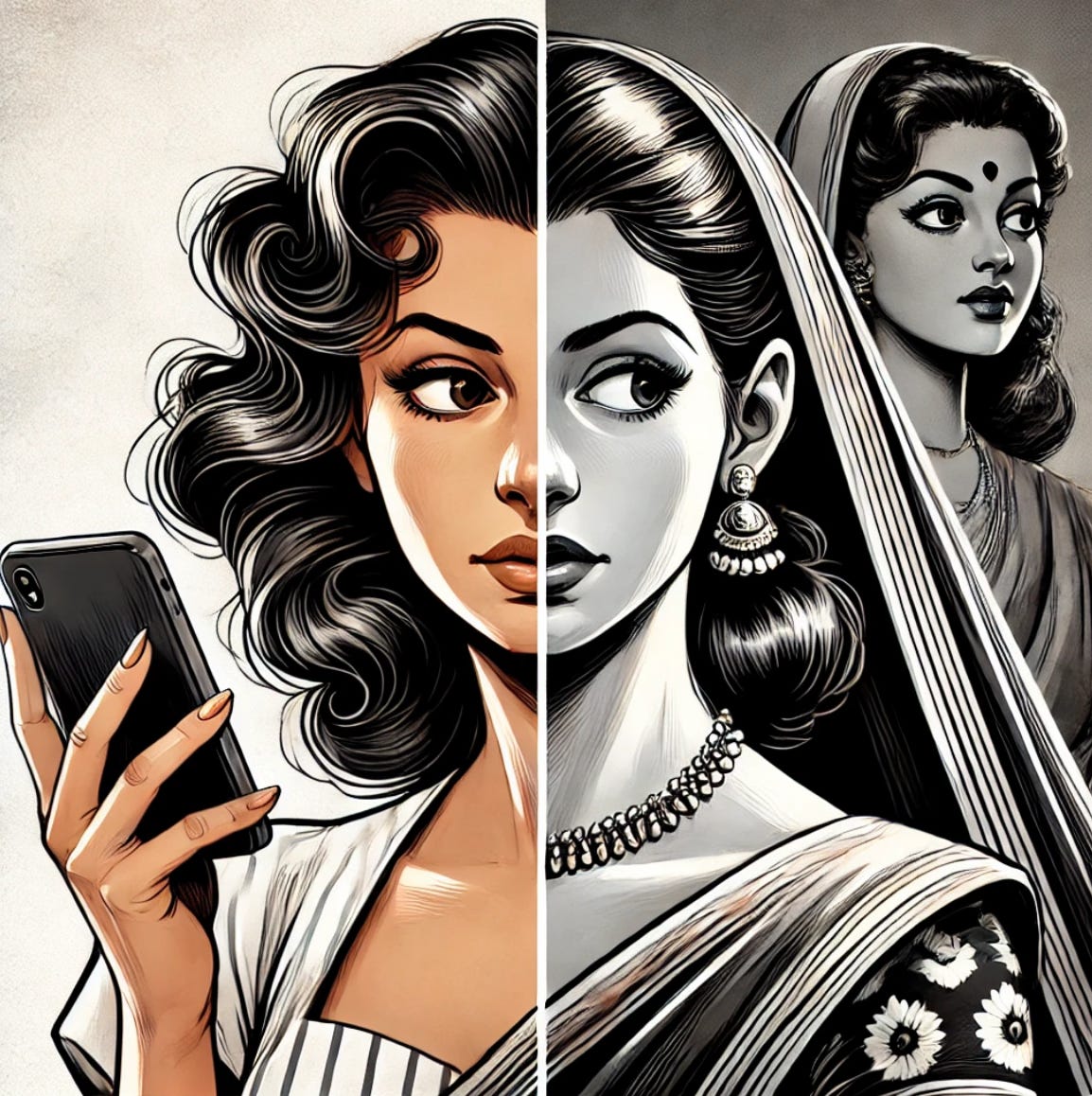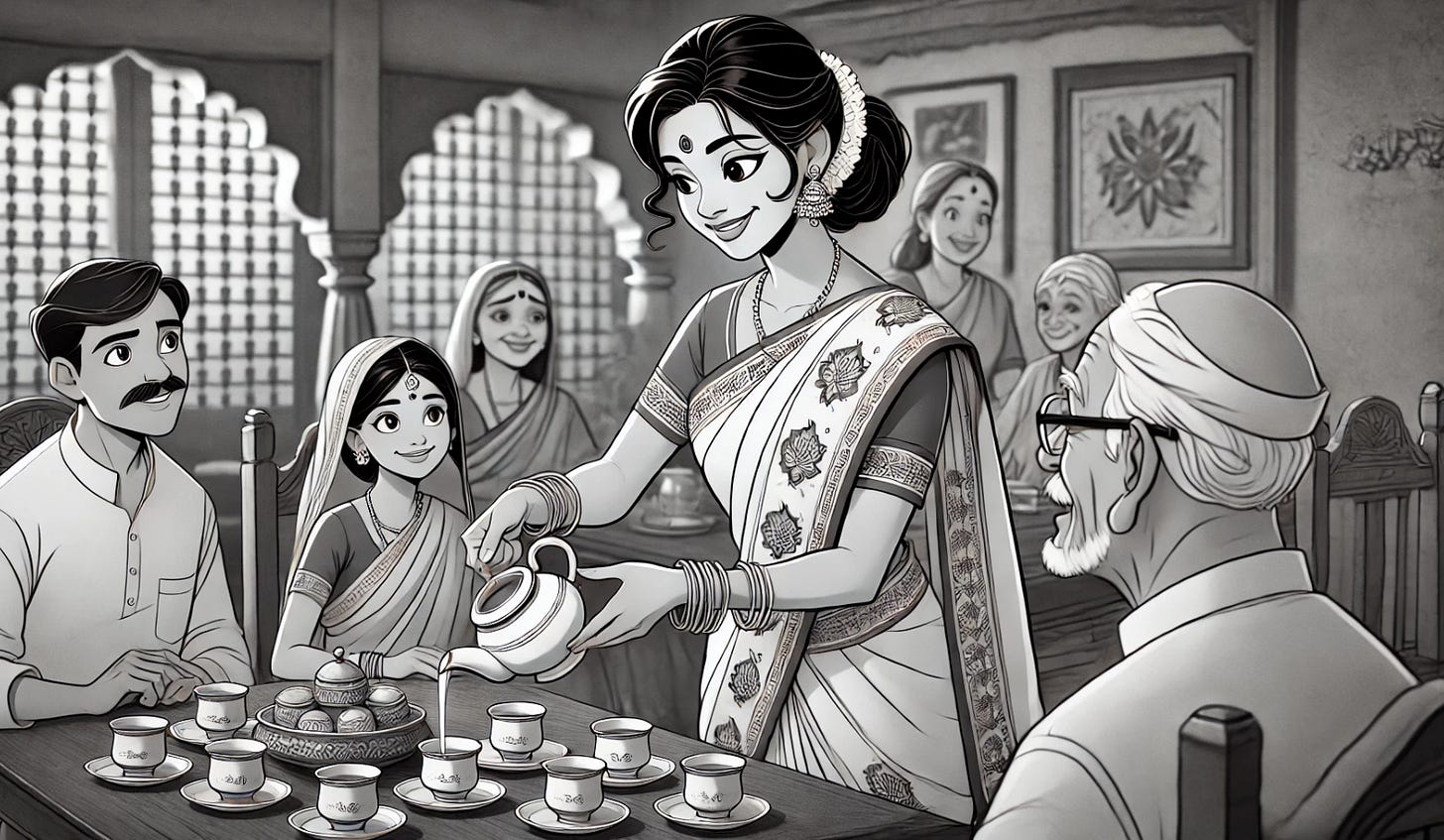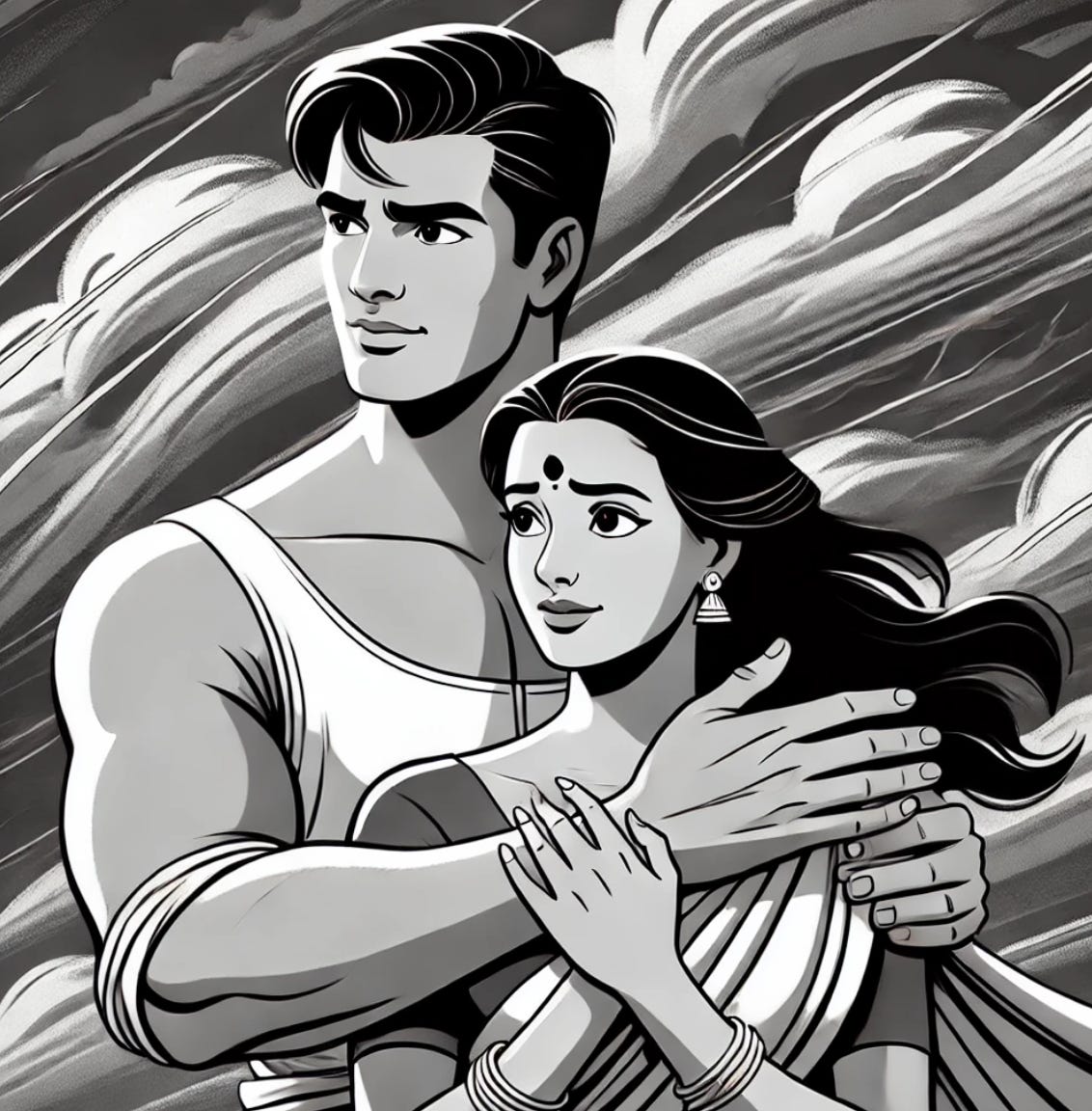India Needs Patriarchy
Discussing Real Solutions to Indian Misogyny
As cultural trends in the west shift to understanding the disastrous consequences of modern feminism for both society and for individual women over the last 50 years, non-western countries like India are now beginning to espouse feminism with foolish zeal. Much of this cultural shift can be attributed to the desire to mimic western culture in a society that idolises “westernisation” as a social marker of wealth and affluence.
The affluent Indian’s perception of “westernisation” however is not true western culture, but rather the modern rot that has infested and distorted it. It is as though an art student who has never seen a tomato is drawing a picture of one using the reference of a rotten tomato. Speaking of rotten tomatoes, recent Bollywood movies feature subjects such as women exploring “sexual freedom” and their “hoe phase”, the celebration of divorce, the abandonment of all those lovely traditional Indian feminine qualities championed by Bollywood in the 50s and 60s such as beauty, reserve, dignity, and elegance. The most recent movie “Mrs.” is nothing but propaganda made to make women resent their traditional roles because it’s abusive and oppressive to cook and clean for your family.
But there is indeed a huge problem in traditional Indian culture’s treatment of women. Every day there are stories of rape and assault happening to normal people in what should be safe environments. One of the more harrowing stories I have read recently was of a female doctor who was gang-raped by staff members in broad daylight at a hospital. Women are not safe if they travel alone in India. Sexual harassment is so common that it is a joke in the rest of the world that if a woman travels to India alone, she is just asking to get groped or raped. In many families, married women are treated like nothing better than bought slaves for the husband and his family to abuse as they wish. The most egregious form of misogyny seen in Indian culture (and many other Eastern cultures such as China and Pakistan) is the mass infanticide of baby girls because girls are seen as being inherently of less value than boys. The birth of a baby boy is celebrated and the birth of a baby girl is treated with pity and derision. This has been the primary cause of the ban of gender disclosure in pregnancy ultrasounds in India in an effort to reduce sex-based abortions.
Many Indian Feminists cite these examples to justify their ideas that divorce should be normalised, all women should pursue career and financial independence ahead of family building, that domestic roles and home-making are inferior vocations and a woman who is “just a wife and mother” is a loser in society. These ideas are a way for women to protect themselves from misogyny: a woman who has financial independence has more ability to walk away from an abusive marriage or suffocating household. A woman who thinks of domestic chores as beneath her will not have to suffer the indignity of serving those who think of her as nothing but a slave or a servant. But then what these “freedoms” afford her is nothing more than freedom from her natural feminine inclinations simply because they are situated in abusive environments. The feminist woman in India, must become a man because to be a woman is too dangerous. This is not a solution, but rather a way of running away...and running away into other problems no less troublesome than those she wished to escape.
The problem, you see, with India and cultures like it, is not that they are patriarchal, but that they are misogynistic and feminism is nothing but a more insidious (and therefore more dangerous) form of misogyny. There is a crucial difference between patriarchy and misogyny and understanding this difference that will help us approach the true solution to the cultural problems that make eastern cultures so suffocating for women and girls.
A Patriarchal Culture is very different from a Misogynistic culture. In fact, they are opposites. A feminist culture is in fact a version of a misogynistic culture. The word patriarchy finds its root in the word pater meaning father and the father has two traditional roles: to protect and to provide. You may argue that these roles are arbitrary cultural designations but if you argue this it is in contention with your very senses that make you aware of the differences between men and women that make these traditional roles imperative for men, and not women, to fulfil. Men are biologically stronger than women and thus better equipped to endure the slings and arrows of worldly problems that are necessary when dealing with the business of provision and the vocation of protection. Women must be soft places for babies to rest their cheeks, warm homes for hugs and beautiful sources of amusement and inspiration. Perhaps you believe I have described a trinket and if you think this, it is because you value tools too much and trinkets too little--and I dare say if I described a woman as a tool, the feminist would complain of feeling used.
Speaking of use. It is no insult to a person to be of use to her family in the best way that she can be. The reason for traditional delegation pattern of household duties to women is that the outdoor duties are too cumbersome and difficult for her to do and men like to take on more difficult tasks...that is, when they are properly ordered men. Men plan for the future, handle things like haggling with insurance companies and car salesmen, paying taxes and mortgages, walking out the outside of the sidewalk and carrying heavy bags. To alleviate women of all those worries about the future so that they can focus on the responsibilities of the present. The primary imperative of the structure of patriarchy is for men to protect women in their families and in their wider communities so that the women in their lives are safer and more comfortable. But there is an important consideration to recall when someone is charged with the responsibility of protection, they are also afforded greater power and authority as well. This is necessary, for a man cannot fulfil his duty to protection without claiming authority as well--no power, no responsibility.
Without delving into the sexual dimorphism of psychological tendencies and temperaments of the two sexes, I will simply state that it is better for both society at large and for individual families when men lead and women follow. This male leadership is not misogynistic inherently, because men also have a duty to lead in a way that benefits everyone in their charge: women, children and the elderly. Patriarchy, in this way, is inherently loving toward women in a way that feminism is not and cannot be because it accepts women as they are rather than lies to them that they can or should be men as well as women. It is important for women to know how to do all the duties of men, in the event that the men in their lives become disabled, die or cannot carry out their duties. But preparing for tragedy doesn’t somehow negate the way things are best ordered under normal circumstances.
Because women’s traditional duties are more focused on the present, they often seem more overwhelming than those of men, but they are no more or less challenging and they are no more or less important to the functioning of a family and of a society. While demarcations of men and women’s chores vary with different cultures, generally speaking, roles designated for women tend to be better suited to their nature, temperament and biology and the roles designated for men better suited for theirs respectively. Without obeisance to one sex at the exclusion of the other, we may yet respect both roles equally. Feminism instead likes to pretend that women have all the work and none of the respect; all the work and none of the benefit.
A misogynistic society is one in which women are blamed for having feminine temperaments, abilities and weaknesses. Women’s roles are not respected or appreciated. In such an environment, it is only natural that women would increasingly want to pursue male roles instead in order to gain some respect, or they would want to share the “degrading jobs” with the men. Modern society in general seems to not appreciate the vocation of domestic management, the skill required for it and the value it brings to not just the family but to society. A lot of this is due to the fact that many domestic tasks are outsourced to lower class workers in eastern culture and so someone who cleans the floors or washed the dishes is equated to a low class worker even if it is just your mother or your wife.
Women do not resent domestic chores, they resent being unappreciated.
Traditional Indian women had beauty, grace, elegance and were hardworking and respectful of their families and elders. In many ways, the disappearance of the traditional Indian woman can be attributed to her abuse by Indian misogyny that made it uncomfortable if not outright dangerous for her to be a woman in this way. If not in dramatic overt ways like acid attacks and rapes, then in smaller ways like daily emotional and psychological abuse and derision, treating her more like a servant and less like a person, have eroded the safety and kindness needed for femininity to flourish.
Misogyny has also been called “beta patriarchy” in which men wish to enjoy the benefits of women’s labour but not fulfil their duty in return. In the case of Indian culture for example, women and girls are required to dutifully fulfil their domestic chores, but are not effectively protected from dangerous and rapacious men. Their towns, villages and cities are not safe for them. They are not provided for and often a girl’s parents, in-laws or husband will require her to bring in an income in addition to completing household chores. The woman in the misogynistic society is expected to thanklessly give her entire life with no prospect of return in the form of protection or provision. This is not a patriarchy.
For a women in this circumstance, the silver-tongued feminist promise of “equality” with men seems very appealing because she has come to believe that the only way to be treated like a human being is to be treated like a man. In becoming a man, therefore, she forfeits her right to be a woman--a natural outcome for a society that hates femininity.
When women live in a properly ordered patriarchy, they enjoy being a woman, and this is illustrated by their enthusiasm for all those chores and responsibilities that are traditionally feminine in nature. Women living in a properly ordered patriarchy enjoy motherhood, cooking, cleaning, sewing, home-making. This is because the patriarch treats women as human beings with human needs both emotionally and physically. Moreover, the patriarch doesn’t merely view women as human beings, he views them as women which means he accounts for their strengths and weaknesses as women which make them distinct from men in the kinds of things that should be expected of them.
Women in a well ordered patriarchy write poetry, paint, sing, study and live life more freely than they would if they were expected to behave like men. Their children are happier and better looked after because their neither see their mothers as miserable nor do they experience their absence because they are away at work. Feminism and misogyny both deprive children of a happy mother. And a happy mother doesn’t require lots of wealth, she simply requires basic respect and appreciation.
The west today is attempting to recover from the miserable outcomes of half a century of rabid feminism has wrought on society. Feminism has left many western women alone and without the love of a family they can look after. They become plant moms, dog moms, and entertain their fur-babies as they would real babies--which is what their bodies truly crave. They yearn for the leadership and protection of men and resent having to stand up for themselves, they cite a million micro-aggressions in the workplace as “sexism” when men simply treat them like men. Not all women are the same, I admit, but generally speaking, what I have said applies to most women.
Indian feminism is reacting to misogyny, and not to patriarchy. But feminism is just another version of misogyny because it too believes the solution is to turn women into men. The real solution, rather, is a social change to make men act more like patriarchs and less like little boys who need pampering from their mothers. They are served a meal at the table not as a little boy looked after his mother, but as a man who has worked tirelessly to make life easier for his wife. Patriarchs are respected and their permission and supplication is sought not due to some tyrannical positioning in the family hierarchy, but because they have earned this respect from their competence and willingness to sacrifice for their families.
Patriarchal societies don’t face the problem of feminism, misogynistic societies do. In this scenario, instead of demanding more “rights for women” to run away and become men, it is incumbent upon women to demand instead for men to fulfil their patriarchal duties instead.
If you are an Indian woman reading this, no, your great grandmother who might have faced gross levels of abuse from in-laws, men or society in general, would not want you to die alone with corporate experience and lots of cats, “a strong independent woman”, she would want you to not have to be strong, she would want you to be loved and looked after by a man so that you could enjoy being a woman.






This is a deep and thoughtful article. A well-ordered patriarchy allows all to flourish, both men and women. As a father of three adult children, two sons and a daughter, who have all become kind, successful productive members of society, I do think it’s a father’s role to discipline his sons and set a good example for them, and to love and protect his daughters and support and inspire them to become their best selves. All children should feel loved and appreciated.
A well-ordered patriarchy also requires restraining the worst inclinations of the matriarch, who in her home environment can be more of a tyrant—and more capricious and cruel—than almost any man can be out in the world. You didn’t focus at all on the role of the mother or the mother-in-law in making the young woman (daughter or bride) miserable. My observations of many cultures over my life time indicate that much of the misogyny and abuse of young women in a culture originates with older. higher status women. I know from personal experience the heavy cost paid by a patriarch who stands up to his wife and reverses her bad decisions.
Mothers also have a role to play in encouraging their sons to be sexually irresponsible or even violent predators. Weirdly, I have seen women who stoutly defend the worst behavior of their sons and always blame the young women for allegedly seducing or egging their sons on. Sons are very sensitive to their mother’s approval and much callousness or even criminal behavior occurs because a son is confident of his mother’s approval. Sometimes a father shares the same bad values as the mother, but I have seen fathers with high values who are determined to discipline their sons and teach them to respect women being undermined by their wives, who are permissive towards their sons and perversely proud of their sons immoral behavior.
Your article is wonderful and perceptive, I offer these observations because I think they make a small contribution that fits seamlessly into the larger context of your thesis.
Loved and looked after by a man so that you could enjoy being a woman. What a beautiful way to put it!